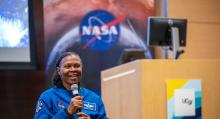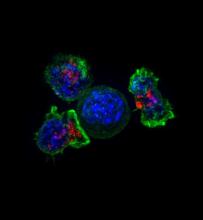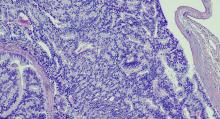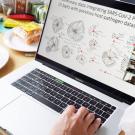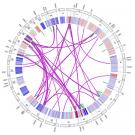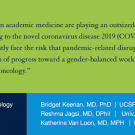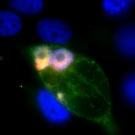News
New Computational Cancer Community (C3) Provides Forum for Feedback, Collaborations
The Computational Cancer Community (C3) was recently created to provide a forum for labs focused on cancer genomics and computational cancer biology and oncology to share their work and to get feedback and input. Below, steering committee member Franklin Huang, MD, PhD, offers further details about
Store Fat or Burn It? Targeting a Single Protein Flips the Switch
As obesity becomes a growing issue worldwide – nearly tripling over the last-half century – scientists are trying to gain a better understanding of the condition at the molecular level. Now, new research led by UC San Francisco scientists suggests that a single protein could play an outsized role in
Pandemic Brings Career Setbacks for Women in Medicine
Women in academic medicine are facing the prospect of career setbacks as a result of the COVID-19 pandemic. Katherine Van Loon, MD, MPH, Associate Professor of Clinical Medicine and Director of the HDFCCC Global Cancer Program; and Bridget Keenan, MD, PHD, a Clinical Fellow of Hematology/Oncology
‘AutoImmunoprofiler’ Builds on Success in Cancer Research to Advance Treatments for Autoimmune Diseases
UC San Francisco scientists have formed a research alliance with pharmaceutical firm Eli Lilly and Company aimed at better understanding autoimmune diseases and fostering the development of new therapies. Based on the innovative Immunoprofiler model launched at UCSF in 2017, the new initiative
Nola Hylton, PhD and Duan Xu, PhD Inducted into Medical and Biological Engineering Elite
Nola Hylton, PhD and Duan Xu, PhD have been inducted into the American Institute for Medical and Biological Engineering (AIMBE) College of Fellows, Class of 2021. This is among one of the highest professional distinctions given to medical and biological engineers. Dr. Hylton is a professor in
New Test Predicts Tumors Most Likely to Respond to Radiation, Chemotherapy
Many cancer patients might respond better to treatments with the help of a new prognostic indicator based on a distinctive pattern of gene activity within tumor cells, according to a new study of human cancer data and experiments on human cancer cell lines grown in the lab. The new research, led by
